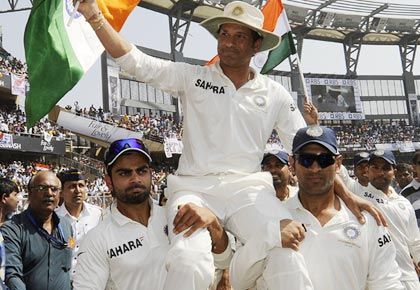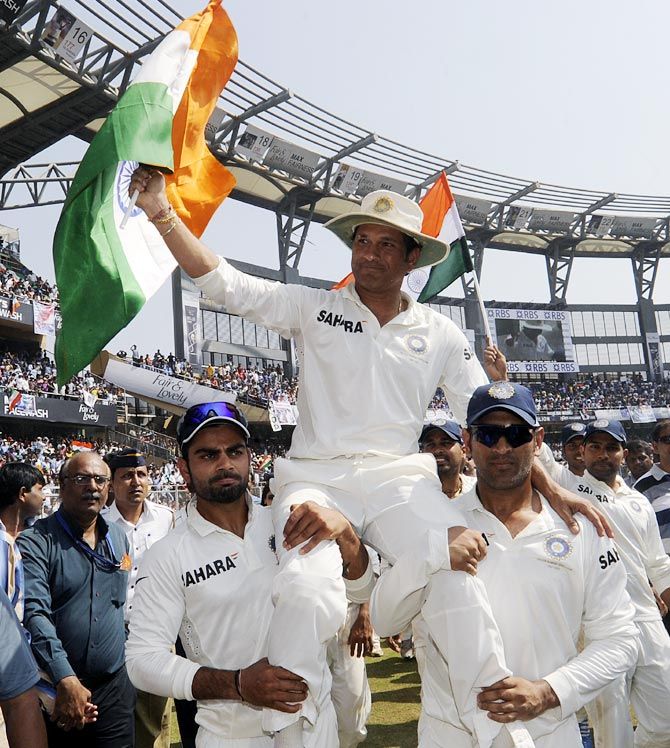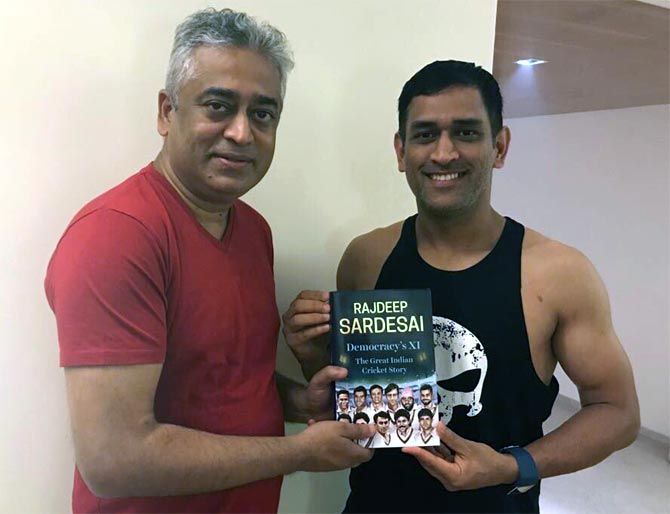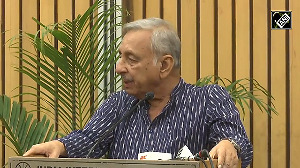 '"Who you know" does not help in scoring runs or taking wickets in front of hundreds of millions of fans, which alone determines your selection to play for your team,' points out Praveen Chakravarty.
'"Who you know" does not help in scoring runs or taking wickets in front of hundreds of millions of fans, which alone determines your selection to play for your team,' points out Praveen Chakravarty.

"I was twelfth man in a Duleep Trophy match. During the break, Sachin asked me for a drink. I gave it to him and shook his hand for the first time. I didn't wash that hand for a few days."
This was Mahendra Singh Dhoni in 2001. Such was his adulation for Sachin Tendulkar. Just six years later, Dhoni was captaining Tendulkar in the national side.
A decade later, "when a tearful Harbhajan hugged me, I got teary eyed but kept my head down so no one would see me crying," says Dhoni about the ecstatic moments immediately after he led India to a World Cup victory in 2011.
The remarkable rise of Dhoni as one of India's greatest cricketers in history is chronicled poignantly and beautifully in Democracy's XI by Rajdeep Sardesai.
The book is a charming collection of anecdotes from the lives of eleven Indian cricketing stars. In writing this book, Sardesai descends from his high horse of broadcast journalism and drops his fame to become one among the millions of cricket crazy Indians.
The sheer reverence and admiration that he holds for these cricketers is on eloquent display.
The book is in the same genre as Gita Piramal's 1996 book, Business Maharajas, which was a collection of India's business heroes and their untold stories.
Sardesai chooses eleven cricketers to chronicle, but this is not a book about India's all-time dream team. This leaves the reader wondering why then the author mischievously chose eleven players to profile.
The chapters on Rahul Dravid and Dhoni stand out for the awe that successful cricketers inspire in the author. The otherwise drab prose turns flowery and evocative in describing these two cricketers.
The author focuses as much on the off-field personalities of his protagonists as their on-field cricketing exploits. This helps Sardesai differentiate and voice his own opinion of these cricketers.
The author's admiration for Mohammad Azharuddin's cricket is matched with equal admonishment of his questionable integrity. His respect for Dravid's mature off-field behaviour is in sharp contrast to his disdain for Virat Kohli's 'in your face lifestyle'.
His disappointment with Tendulkar's post-cricket career of a 'Bharat Ratna where expectations are greater' is subtly matched by his deep reverence for Dhoni's carefree lifestyle, eschewing all publicity.
These conspicuous differences brought out in a nuanced manner makes this a thoroughly enjoyable book for thoughtful cricket fans.
Just as the 'XI' in Democracy's XI is misleading, so is the 'Democracy'.
This book is not some profound tome of India as a sovereign Republic versus India as a cricketing nation. Neither is it a persuasive chronicle of India's cricketing history through the lens of India's political economy, as Sardesai may have aspired.
He tries hard through various attempts to draw puerile parallels between India's 1991 economic transformation and the advent of Sachin Tendulkar or, the ascent of then prime minister Manmohan Singh and the rise of small town Dhoni.
Inexplicably, the author thinks the rise of 'Hindi speaking' Kapil Dev is somehow linked to the rise of N T Rama Rao and Mulayam Singh Yadav as regional politicians.
While one can understand the temptations of the author to coalesce his very successful journalistic career with his failed cricketing career in describing these events through time, but the linkage comes across as inane and incoherent.
The book is at its best when the author sheds such pretense and turns into a fanboy blessed with journalistic skills and extraordinary access to these cricket stars, digging out nuggets and nuances about them.
The title of the book is a misnomer and is a simple collection of short stories of eleven Indian cricketing heroes.

Sardesai also waxes eloquent about the innate meritocracy of sport through the prism of his personal experience of an aspiring cricketer that failed to make it big despite being a successful cricketer's son.
This notion justifiably exaggerates the author's respect for successful cricketers. That sport is among the most meritocratic professions in society is a well-established and accepted notion.
The 'myth of meritocracy' in most other spheres of life from academics to business to politics to entertainment has been well understood and documented for nearly a century.
The current debate on rising economic and social inequality in the world is premised on this very belief that meritocracy is a myth.
One's genes and geography are the most significant determinants of one's success or failure in life. In other words, a child's birthplace and parents determine her future.
Scholars on inequality have long argued that ideas such as the 'American Dream' and 'equal opportunity' were founded on exaggerated notions of meritocracy.
Sports is the shining outlier.
'Who you know' does not help in scoring runs or taking wickets in front of hundreds of millions of fans, which alone determines your selection to play for your team.
Sardesai's lament that other professions are not as meritocratic as sport is neither new nor relevant to this book.
Overall, Democracy's XI is a pleasurable book for both passionate cricket fans and knowledgeable aficionados. But it is certainly not a profound book characterising the interplay between Indian democracy and sport, as the title indicates or the author implies.
Praveen Chakravarty is a policy economist and a public commentator.









 © 2025
© 2025